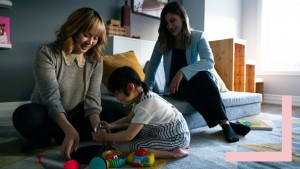Social ABCs: Helping Toddlers and Parents Connect
March 7, 2022 | News

The Social ABCs is an early intervention program for toddlers with diagnosed or suspected autism and those showing signs of delayed social communication. It is delivered throughout Ontario—at Holland Bloorview Kids Rehabilitation Hospital, McMaster Children’s Hospital and the Children’s Hospital of Eastern Ontario—as well as at the Glenrose Rehabilitation Hospital in Alberta. It is led by psychologist Dr. Jessica Brian who co-developed the program alongside psychologist Dr. Susan Bryson Dalhousie University.
The basis for the program originated back in the 90s, when Drs. Brian and Bryson were first looking to better understand the early signs of autism.

One of the goals of this research was to develop an intervention that could be implemented early on before an autism diagnosis was actually made, because we know that the earlier we intervene the better the outcome for both children and families,” says Dr. Brian.
As the program took shape, it was refined through several studies and parent feedback, and started receiving funding from Kids Brain Health Network (KBHN) in 2015.
“The Social ABCs was one of the initial intervention projects we funded, and we have continued to nurture and support the program which is now gaining international recognition,” says Dr. James Reynolds, Chief Scientific Officer of KBHN. “It’s a perfect example of how we can equip parents to be primary interventionists during a time of critical brain development while their child is on a waitlist for a diagnosis.”
The Social ABCs is delivered to toddlers between the ages of 12 to 36 months because this is when brain development happens quickly, and when relationships with their primary caregivers are critical. The program is parent mediated, meaning trained coaches work directly with parents to help them learn strategies for helping their toddler communicate and interact socially. The main goals are for the child to share positive emotions, such as a smile with their caregiver, and to direct their vocal communication to their caregivers.
The program was initially offered as one-on-one coaching in a family’s home for 12 weeks. In 2017, the team developed a group model where several families would meet at Holland Bloorview to learn about the techniques together and then receive individual coaching at the clinic. When the pandemic hit, the Social ABCs team pivoted and started offering both group and one-on-one sessions virtually, initially within a research context. The team recently received CIHR funding to run a clinical trial to evaluate the virtual group model.

We learned very quickly that the virtual model works quite well and being able to offer it online has allowed us to reach even more families” says Dr. Brian. “Working together as a team to make such a big shift and still have a program that feels genuine and family friendly and meaningful is something that has been very exciting for me and my team.”
While many types of autism supports exist, Dr. Brian says the Social ABCs is unique because it’s focused mainly on supporting the parent to help their child learn and grow, and it’s strengths-based, meaning only positive feedback is given.
“The Social ABCs is meant to be an intense intervention, with the expectation that parents will use the skills they’re taught on an ongoing basis with their little ones at home,” says Dr. Brian. “We want parents to feel empowered to know they have the tools to support their child. We also don’t expect the Social ABCs to be the only thing families will need, but we do see it as an enriching foundation and great start for many families.”

Mimi Playing
With continued support from KBHN, the program has been implemented across Ontario, Alberta, and Nova Scotia, with training underway in P.E.I. The Social ABCs has received global interest, currently being implemented in India and Israel. Kids Brain Health Network is working with the Social ABCs team to advocate for the program to become even more widely accessible across Canada and is supporting efforts to create a training hub so service providers and agencies across the country will be able to administer the intervention themselves.
“KBHN funding has been pivotal in allowing us to take our research findings and scale them up, so we could bring what our early research taught us about autism in toddlers into the community,” says Dr. Brian. “The Network also continues to allow us to reach more children and support more families who could benefit from the Social ABCs program.”
You can read more about a family’s story with Social ABCs and discover Mimi’s story.
Social ABCs is just one of more than 150 initiatives supported by the Kids Brain Health Network to improve outcomes for children with neurodevelopmental disabilities and their families. Read more about Social ABCs and KBHN.